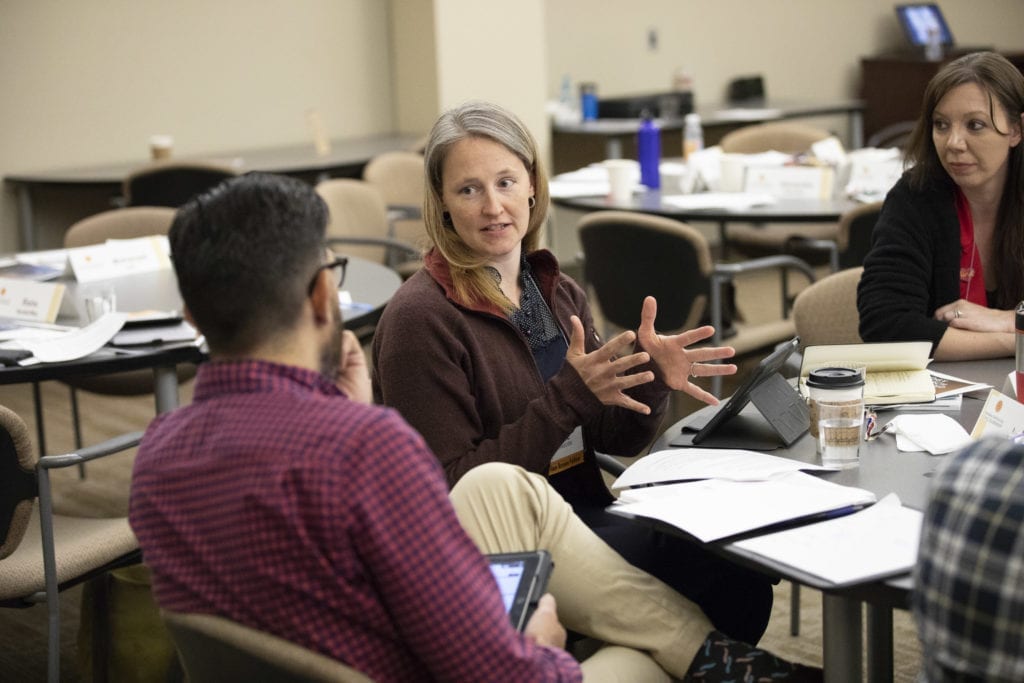
Flinn-Brown Fellows learn, in large part, by doing. Fellows in each cohort and the entire Flinn-Brown Network have a wealth of experience, expertise, curiosity, and contacts to bring to project and policy development. Throughout the Flinn-Brown Civic Leadership Academy seminar series, including work on an intensive project, teams of Fellows representing different perspectives, backgrounds, and regions identify specific challenges, solutions and viable choices to address important state issues.
For the Academy projects, each group is asked to create a potential legislative package to address a timely issue in a big way, taking into account limitations such as feasibility in today’s environment, the topics’ details, what research and experience suggest, current players, history, public opinion, and human nature. Teams present their packages to long-time Arizona civic leaders for critiques and conclusions about the project’s chances in the marketplace of ideas.
2018 Fellows, for example, designed clear-eyed approaches for significant changes regarding seven significant Arizona issues. Their work demonstrated again that Flinn-Brown is about big ideas, solutions, and connections with others who share a commitment to Arizona. Projects included:
Market-based Incentives and Credits for Water Conservation
The proposal creates incentives to conserve existing water supplies through a Water Conservation Trust Fund and a market to trade conservation credits. The group thought a free-market plan makes sense in Arizona, where population growth and ongoing drought threaten the water supply. The proposal also suggests a local approach to rural groundwater conservation.
New Mechanism for Road and Highway Construction
The proposal suggests a per-mile-driven fee for all Arizona vehicles, except large commercial vehicles. Arizona’s gas tax, which provides about half of state highway revenue, is mismatched with contemporary road demands as vehicles become more fuel efficient and electric cars pay no gas tax. A “Road User fee” would be paid at registration based on self-reported miles driven. Those who paid more in gas tax would receive a refund to achieve equity between drivers of gas-powered and electric cars.
Private and Public College Savings Matching Grants
Arizona has set an ambitious postsecondary education attainment goal to ensure that Arizonans have the skills and training for a competitive economy. This project seeks to prevent students from leaving college for financial reasons, including the cost of college. It combines state funds, through the Arizona Financial Aid Trust, with a structured student savings plan and philanthropic dollars.
Greater Access to Pre-K for Very Young Arizonans
Even though education at all levels is increasingly vital to success, many of Arizona’s 3- and 4-year-old children do not attend preschool. Expanding access, while keeping enrollment voluntary, could serve thousands of additional children each year. The proposal institutes a statewide property levy, among other actions, to expand access to every Arizona child.
Transition to Complete Vote by Mail
Voting is at the heart of civic life, but ballot mechanics can be complex. This proposal presents a transition to a completely vote-by-mail system, building on what is practiced by a majority of voters. The plan projects outcomes that include saving money, increasing turnout, and making voting easier, more convenient, and more accessible.
Leveling the Playing Field for Some Independent Candidates
Approximately one third of Arizona voters are not affiliated with a political party, yet candidates who do not run as a party representative face higher barriers to qualify for the ballot. This proposal would reduce the number of signatures needed for independent candidates to achieve ballot access and extend the gathering period for independents running for statewide offices and U.S. representative and senator positions—but not Arizona legislative seats.
Marijuana Possession Reclassification
This proposal would allow judges to sentence repeat drug offenders to a rehabilitation program rather than prison time by designating marijuana possession as a misdemeanor rather than a felony. (The proposal would not change laws for trafficking marijuana.) The proposal aims to save money and reflect changing laws and attitudes related to medical and recreational marijuana in Arizona and other states.